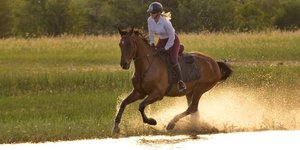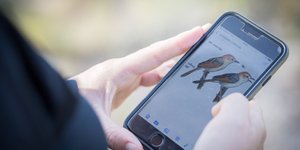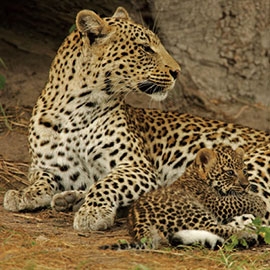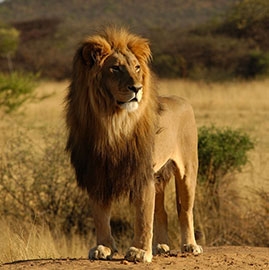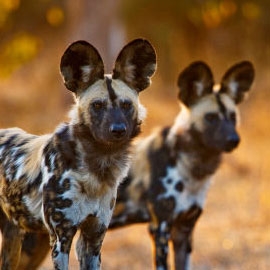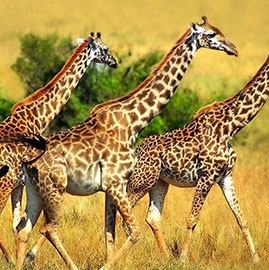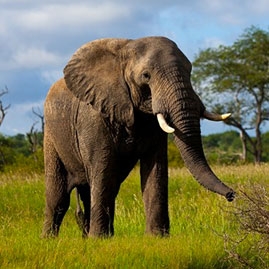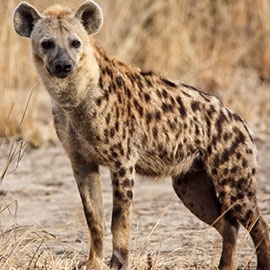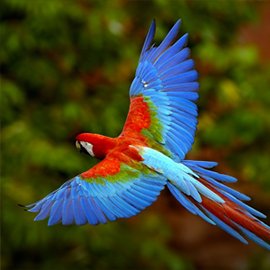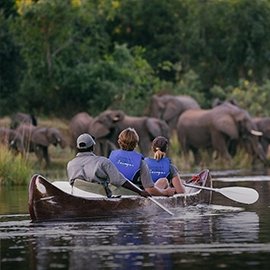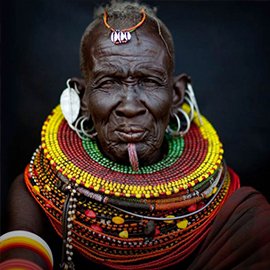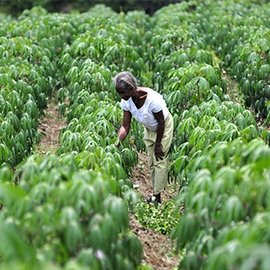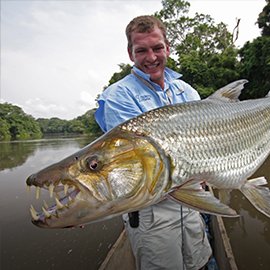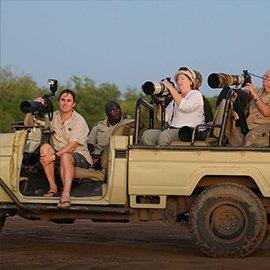Hwange National Park
What YAS members think
Highlights
- One of the largest concentrations of elephants in Africa
- Close proximity to Victoria Falls
- June through November are the best months to visit, weather-wise
- Lesser known destination with more affordable safari options
About Hwange National Park
Hwange National Park is located in the northwestern corner of Zimbabwe, on the border of Botswana. It was originally established as a game reserve in 1928 and was named after a local Nhanzwa chief, Hwange Rosumbani. The date it became a national park, however, appears to vary from one source to another, with some sources stating 1930, some stating 1949 and some stating 1961.The park is 14,651 km² (5657 mi²) in size, making it the 10th largest national park in Africa and the largest national park in Zimbabwe.
Wildlife of Hwange
Because of the park’s close proximity to the Kalahari Desert, the general landscape of Hwange is of desert scrub and grasslands. The foliage is not dense, particularly compared to other safari destinations, and the majority of forest is that of mopane. Hwange is an excellent destination for wildlife viewing and boasts over 400 species of birds. It is also home to many large mammals and has one of the largest concentrations of elephants in Africa, with an estimated number currently around 30,000 to 40,000. It is estimated that four of the five ‘big five’ animals can readily be seen here: buffalo, elephant, leopard and lion. The rhino population has essentially been wiped out, although a few black rhino may remain. There are also efforts to reintroduce white rhinos back into Hwange. For those putting a black or white rhino sighting as a top priority, Hwange should not be their first choice. For those seeking a more intimate wildlife safari, absent of tourist crowds, Hwange National Park is a great first choice.
The safari lodging in Hwange tends to be concentrated around the waterholes and is generally of very high standard, with the majority being tented camps. It is an excellent safari destination due to its high concentration of wildlife and its well-established tourist infrastructure. It is also located two hours from Victoria Falls, making it an attractive choice for those wishing to combine a safari with a trip to the Falls. Hwange is recommended for all levels of traveler.
When is the best time of year to visit Hwange?
Hwange has two distinct seasons: a wet and a dry season. The wet or rainy season runs from approximately December to March. It is as this time that the local flora becomes green and lush, and bird viewing is at its peak. The animal viewing is less optimal as the animals tend to disperse a bit due to the increased availability of water sources. The rainy season also coincides with Zimbabwe’s summer, and days are hot and nights are warm.
Like the Serengeti, there are little to no off-road driving options in Hwange, which helps keep the animals less accustomed to seeing safari vehicles. The dry season runs from around July/August to October, with September and October being the driest months. The dry season is considered the best safari time at Hwange National Park as large concentrations of game, in particular elephant herds, must drink from the man-made and pumped waterholes. The dry season also coincides with Zimbabwe’s winter months, and while days are still warm and sunny, nights can get very cold and down to freezing temperatures.
 South Africa
South Africa
I didn't know what to expect when I visited Hwange National Park for the first time. Before I visited, I heard stories of big elephant herds, high quality guiding and exciting walking safaris. Nothing I heard or read before could have prepared me for the adventure and fond memories. We started with a flight from Victoria Falls into the south of the park, when we landed we were met with friendly smiles, a vast openness that filled us with adventurous expectation and a small drinks table to quench our thirst. Our adventure started with a safety briefing (very important), a quick loo stop (loo with a view) and a refreshment (first gin and tonic of the day). We then headed off in open sided game drive vehicles and not too far from the airstrip we encountered a herd of elephants. Hwange has over 40,000 elephants and depending who you talk to the number changes. Interesting fact that some elephant moves between Hwange and Chobe, thus the constant change of number of elephant in the park. The guides at the camps in Hwange are excellent, every guide we encountered had his own unique style. They were all knowledgeable, passionate, engaging and I would rate them as the best in Africa! Scenically the park is beautiful and the landscape changes as you move through the park. It is best in the drier months as the animals move to the waterholes, that said, the green season is just as exciting as the wildlife is resident and it is a great time for birding. Hwange has over 400 species of birds and green season is the best time for bird photography. Another great thing about visiting in green season is that prices are low and there are few other visitors. Accommodation standards vary in Hwange and there is something for everyone, I highly recommend Camp Hwange (excellent guides, fun hide, the camps faces a waterhole plsu the variety of activities enhances your overall experience), Linkwasha Camp, Somalisa and The Hide. Important to know: 1) You can access Hwange via road and air transfer, we recommend that you use both methods, fly-in and road transfer out or vice versa 2) Do as many of the activities as you can, walking, game drives and use the hides 3) A minimum of 3 nights is ideal as this gives you two full days to fully experience the area and the activities 4) For something different, see if you can include the Elephant Express 5) Don't exclude Hwange if you are traveling in the green season, it is still exciting and offers a great experience
Sort by:
Hwange National Park is home to more than 110 mammals including the big five and 400 species of birds. Various types of accommodation ranging from tents to luxury safari camps are available in the park. Different safari companies offer game drives in this park although self dives are also permitted. The Hwange main camp is about 200km from Victoria Falls and 235 from Bulawayo. This is truly a place to go if game viewing is one of your hobbies.
Around half the size of Belgium, Hwange National Park is the largest National Park in Zimbabwe. Easily accessed from Victoria Falls by light aircraft, or 2-4 hours by road, this relatively unknown safari gem provides a hugely rewarding wildlife viewing experience. The park is a mix of open grasslands and mopane woodland - though towards the end of the dry season, the landscape becomes grey and stark, as all signs of plant and tree life die back from the lack of rainfall. Hwange is renowned for huge numbers of elephant, resulting in what some might view as a one-dimensional safari experience. Indeed, waterhole viewing in some parts of the park is an exercise in watching herd after herd of the world's largest mammal plodding to the water's edge. But then starts the fun, as they playfully throw water over their backs to cool off, at each other in play, roll over to bath, and roll in a 'mud bath' to cool down. Watching this behaviour as they shelter their babies from the harsh heat, using the shadow from their own bodies, is a fascinating sight. Some lodges have built a hide into the side of waterholes - affording superb close up photography of elephant toes and trunks. A mobile phone camera is all that is needed here! Certainly there are areas of the park that afford a greater variety of wildlife viewing: lion prides, wild dog, buffalo and leopard are regularly sighted. Because the park doesn't have the same concentration of safari camps of some other parks in Southern Africa, the experience is far more exclusive - no queuing to view sightings here ... indeed, other vehicles in parts of the park are a rarity. Zimbabwe is also renowned for the intensive training programme that guides are required to undertake to quality - the result being a hugely informative and interesting narrative - not here will you hear the usual anecdotes about antelope - rather, quirky information about behaviour perhaps recently discovered or researched. Game drives are, of course, the norm - day and night, but no safari to this park would be complete without a guided walk. Traditionally an opportunity to learn about the smaller mammals, medicinal properties of plants, bird life, and animal prints, expect a Zimbabwean walking guide to not be afraid to track elephant and lion up close, on foot. A hugely rewarding and memorable experience. There are, of course, a range of camps and lodges to suit all budgets. Easily combined with Victoria Falls and perhaps as part of a Zimbabwe circuit taking in Lake Kariba, Mana Pools and Matobos National Park, as well as other destinations in Southern Africa, Hwange is a little gem waiting to be discovered by the masses.
Hwange National Park itself is a beautiful area - so beautiful that you can get lost in the scenery and not realize you have been bouncing about in the back of a game view for hours in search of various game and birds. There is ALWAYS something to see in HNP, from the massive herds of buffalo & elephant gathered around the waterholes in the late afternoon, to the prides of lion with their cubs playing on the roads in the early morning, to the herds of zebra, wildebeest, kudu and impala in the open vleis or thick bush munching on the tree leaves, to the magnificent scenery which changes constantly from mopane and teak forest's to open savannahs, to thick shrubs to breathtaking acacia groves! A few moments stick out in my mind from the various visits in the dry season and green seasons to Hwange National Park; the best being - the late afternoons in the acacia groves watching the troops of baboons frolicking and feasting on various bugs and mites before heading up the trees to roost for the night; the early morning game drives, and stopping at a breathtaking waterhole for a coffee/tea to warm you up from the crisp wind; ending the day overlooking a waterhole with the sun setting and a herd of buffalo or elephants wondering in with a dust cloud trailing and most just sitting, putting my camera down and enjoying a moment watching an animal or bird carry out its daily activities. Hwange is a beautiful park with so much to offer; you just need to let go of your expectations to truly enjoy the beauty that it is!
The term Place of Elephants comes to mind when I think of Hwange National Park I have been to Hwange numerous times, during different times of the year, and elephants are always a guarantee, especially in the month of August. The highlight of each afternoon game drive is sitting at the Nyamndlovu Watering Hole at sunset sipping on an ice cold G&T waiting in anticipation for the elephants to come drink; out of nowhere hundreds and hundreds of elephants appear, from every which way you look, for as far as your eye can see there are elephants. The most incredible part of watching these gentle giants is the respect they have for each other; one herd will come in, drink, play, have a mud bath and then shift over for the next herd to join in the fun and so it goes on until the matriarch of the herd decides to leave and off a few hundred ellies go....AMAZING Hwange is beautiful in itself as a park, too. If you are elephant-crazy like I am, this is the place to visit!
We chose Hwange because it's renowned for its great population of elephants. My husband is a great fan of them and we were not disappointed. We were greeted by one just minutes after landing. We spent three nights at the splendid Somalisa Camp in the middle of the bush where elephants come to drink from what was originally intended to be a pool for the guests but the elephants took it over. It was a privilege to watch them drinking just a few metres away. This environmentally friendly camp is composed of seven elegant tents with the luxury of ensuite bathrooms, and indoor and outdoor showers. Hwange is a beautiful mixture of grassy plains and dense forests of acacia trees. Water holes of ground water pumped using solar energy attract herds of elephants and other mammals, as well as birds. The grass was high at the end of April but it didn't prevent us from seeing many mainy inhabitants, lions in particular, and many birds. At this time of the year, the nights and early mornings are very cool so a few layers of clothes are recommended but once the sun is up, the temperature is very comfortable at around 25-30°C. The sunrise and sunset are a splendour and the night skies are perhaps the most beautiful, I've ever seen. One can't remain indifferent to Somalisa where the territory really belongs to the animals and we humans are privileged guests.
Hwange is particularly renowned for its great elephant herds. Extended family groups of close to a hundred elephant can be found. An excellent chance to observe interaction between the generations and peers. This is the place to see Elephant, and hundreds of them!! Enormous herds flow to the different water holes created in the area.
Visited Hwange on the heels of my visit to Victoria Falls. I was pleasantly surprised with this park and really loved the lodging there. It wasn't high season for me, so they weren't over-crowded. I did a self-drive safari and found it fairly easy. I would recommend going with a group. I went with three other friends and felt safe.
Driving into Hwange National Park for the first time, I didn't really know what to make of it. The park was virtually devoid of any and all tourists, and this was made more apparent when my small party pulled into Sukumi Tree Lodge and we ended up being the only guests at the resort for three days. The apparent desolation aside, we headed into the park at the crack of dawn each day and found impressively large herds of elephant, zebra, impala, giraffe and the more rare gemsbok. But nothing could have prepared us for the expansive variety of 'fauna in flight'! There were several congregations of Steppe Eagles, literally hundreds! Other stars of the show included the Burchell's sandgrouse, the Red-billed spurfowl, and Rufous-naped lark. Hwange National Park is a bird lover's paradise. It's also important to note that there are several private areas within the park, designated for those staying at an number of the nearby exclusive resorts. However, if you're here in October, you're bound to find it relatively empty!
One of the nice things about going on safaris is that it appeals to all ages. Young children, teenagers, parents and grandparents can all have fun doing something together. Last December, my extended family and I spent two nights at Hwange National Park. The age range of our group was from 7 to 72, and we all had a wonderful time. We stayed at Main Camp. The chalets were clean, but basic. There is a restaurant and bar onsite, and we appreciated not having to do the cooking and washing up. Although the game density in Hwange is high, this was the rainy season, and we didn't see that many animals. But the birdlife was prolific! One of the youngsters had downloaded a bird guide on his iPhone. This app had pictures and an interactive map that helps you identify birds by using your location. But the most amazing thing was that it had bird sounds! We spent hours spotting birds, listening to their sound, and using the app to identify them.
 Australia
Australia
Hwanges a brilliant park located not too far from Victoria Falls making it the ideal game park should you wish to get the best of Africa in one short visit. This was the first ever game park I visited, before returning to Africa to work for three years. Wed originally planned to do a day trip here but were advised against it because the roads from Vic Falls were not very good at the time. Totally happy that we managed to squeeze in a 3-day trip instead, because the park really deserved it. Our first game sighting was an elephant on the road out of Vic Falls on the Zambian side and we spent like an hour looking at him...not knowing that wed see absolutely huge herds for the nest three days! (lol) Anyway, I remember falling in love with this park and even in retrospect Id rate it as one of the best. A LOT more luscious then Id expected (considering its close proximity to the desert) and absolutely brimming with wildlife, which is no easy feat in Zimbabwe, especially in the last few years when poaching has been rather strife. We stayed at the self-catering camps both nights and they were more than fine, if not a little simple. When we win the lotto and come back well definitely pick one of the 5* lodges...geeeez they looked divine! My highlights here would be an almost eye-to-eye meet with a hyena during a night drive and a camp visiting family of Pumbas!!! Expect to see a lot of elephants and lots of birds, along with most big game and enjoy gorgeous walks to watering holes. All in all, ideally located and just grand.
Driving to Hwange National Park
The nearest international airport is Livingstone. The drive to Hwange is around 3.5 hours in normal conditions. People who land at this airport normally combine their safari with a trip to Victoria Falls. Note that the airport is in Zambia and a border crossing will be required. You will want to check your country's travel requirements for both countries to ensure you've the proper visas.
It is also possible to drive from Harare International Airport in Zimbabwe. The drive is around seven hours in duration, in normal conditions.
If you are considering driving from Lusaka, Zambia, the drive is around nine hours, not including border crossings.
Domestic flights to Hwange
Air Zimbabwe offers daily flights from Harare to Hwange. The flights are one hour in duration and are normally direct.
Fastjet also offers direct flights from Harare to Hwange a few times per week.
The following airlines travel to Hwange National Park

Wilderness Air is proud to be the air partner of Wilderness Safaris, a responsible ecotourism and conservation company with private access to the finest wilderness and wildlife areas of southern Africa. Wilderness Air began operating in 1991, with one aircraft based in Botswana servicing two camps in the Okavango Delta. Today, Wilderness Air is also based in Namibia, Zambia and Zimbabwe, operating over 35 aircraft and employing over 50 pilots. Throughout its time, it has maintained its excellent reputation for safety and guest service. We operate a varied fleet of light aircraft, chosen for their ability to transport visitors comfortably to remote wilderness destinations with dirt airstrips. Each aircraft type has been selected based on its ability to transport different numbers of passengers, over different ranges. Our fleet operates on a daily circuit within the regions. Wilderness Air is privileged to fly into some of the most pristine wilderness areas in the world. We believe that flying is an integral part of each guest's travel experience and that our pilots' passion and professionalism can make a genuine contribution to journeys that change lives. Visit website
Also flies to:




Hwange map
Related articles
Latest photos
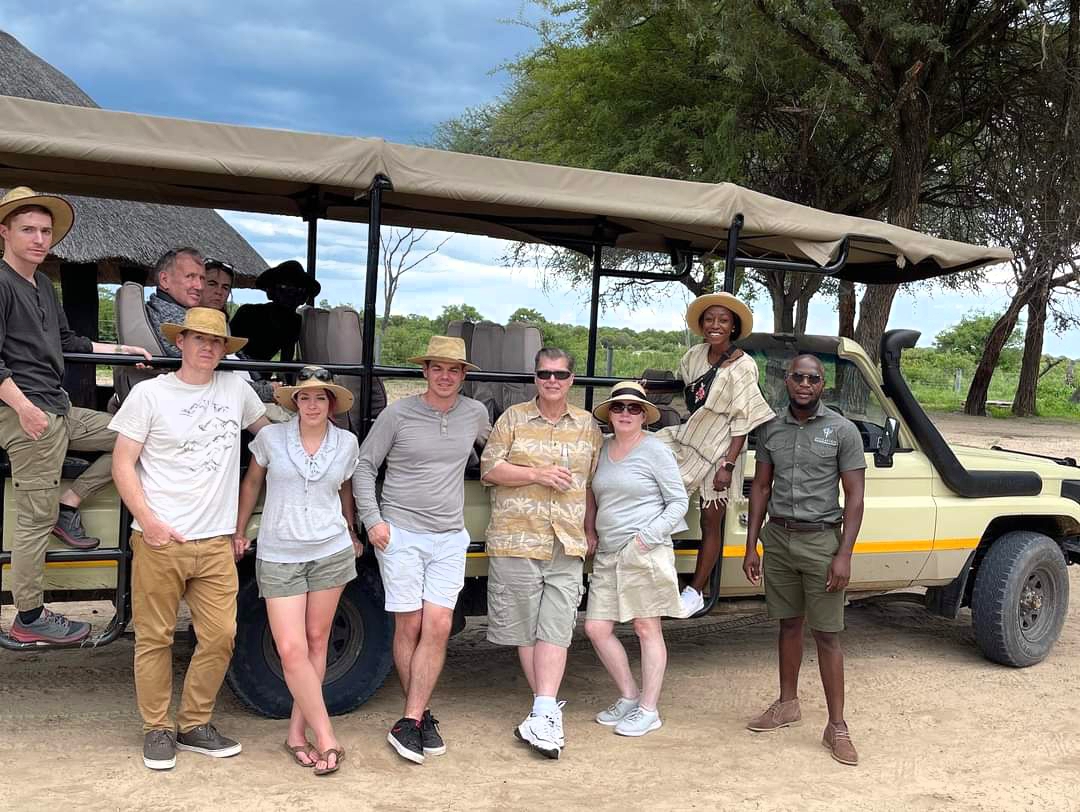


 Zimbabwe
Zimbabwe
 United Kingdom
United Kingdom
 France
France
 United States
United States
 Canada
Canada
